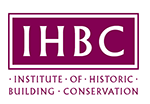
The mark of the conservation professional
IHBC Research & Guidance
- IHBC Guidance notes
- Research
- Guidance
- Developing Standards
1/14: Planning Authority duties in the provision of appropriate specialist conservation advice in England
INFORMATION AND PARTNERSHIPS
HER21/6013
Download PDF
Planning Related Applications for Judicial Review
An IHBC Research Note: RN 2013/2, June 2013
Download PDF
IHBC Research Note 2013/1
Loss of senior conservation staff and senior conservation posts in England: March 2011 – April 2012
Download PDF

IHBC Guidance Notes
Click the links to download or view the IHBC Guidance notes co-ordinated by the Technical Sub-Committee
The repair of Earth Walled Buildings
by Bob Nother
IHBC Technical Sub-Committee paper on French Drains
by Ian Hume
Forced Entry to Listed Buildings
by Bob Kindred
A Stitch in Time
by David Wrightson, Acanthus, Lawrence & Wrightson Architects
(published in association with the SPAB)
Drafts approved by IHBC’s Committees for Policy and for Education, Training and Standards, 2014
Context: Standards in practice and quality assurance
The need to value of standards in the discipline of conservation is acknowledged in the IHBC’s Corporate Plan 2010-15 (CP 10), Action 2.1:
Standards are a fundamental tool in professional processes. Standards can play especially critical roles in conservation by:
- generating efficiencies in the delivery of conservation, by representing agreed and consolidated principles of practice, and
- helping in the scrutiny of that practice within quality assurance processes.
Issue: Challenges for interdisciplinary standards
Conservation is inherently an interdisciplinary activity (ICOMOS 1993). Barriers to that interdisciplinary activity will threaten successful conservation. Unless standards reinforce practice inclusively across the relevant disciplines they may be seen as obstructive to the delivery of outcomes rather than as conclusive statements on how to secure those outcomes.
To date, conservation standards usually have been based on a description of practice, often based on judgement within a particular discipline. If standards remain no more than the description of a judgement within one or more select disciplines, they are unlikely to be adopted as the definitive statement on the effective delivery of sustainable conservation outcomes.
However, if conservation standards are based on sound evidence, they will offer a secure foundation for their adoption by all parties involved in the delivery of conservation, regardless of practice or discipline.
IHBC’s evidence-based standards for conservation professionals
Effective conservation standards should be developed out of research-based evidence supported by practice-based guidance. Sound evidence must be developed within a credible evidence-based research process. However that research can underpin practice only where proven in operation. Testing of evidence-based practice standards takes place through the development and operation of guidance for practitioners.
Consequently, the IHBC’s development of standards will begin with developing research that generates evidence to shape practice through guidance that, when tested, underpin standards.
In summary, the IHBC will develop its standards as follows, by:
- Promoting research, gathering data to establish Evidence
- Developing Evidence into Guidance that shapes Practice
- Testing Guidance, in Practice, to underpin Standards
IHBC priorities for production of standards – Strategic: Advocacy
The IHBC is uniquely placed to integrate conservation research, guidance and standards to deliver advocacy supporting conservation outcomes. The IHBC’s priorities in planning for research, guidance and standards, consequently, are shaped by their potential to deliver advocacy.
Principles in identifying and interpreting evidence
As conservation is an interdisciplinary process, the nature and scope of the practice of conservation is necessarily diverse.
To ensure that the IHBC’s strategy for developing standards is fit-for-purpose, appropriate interpretation strategies must be identified. Specific approaches are justified for use by the IHBC where they sit within the recognised framework of evidence-based conclusions as follows:
- Evidence includes empirical, for example based on practice
- Methodology includes heuristic, for example using aggregated evidence
- Logic includes inductive, for example though indicative conclusions.
Summary: communicating & promoting evidence-based standards
Successful advocacy depends on the promotion of credible standards based on an accessible evidence base that informs practical guidance.
The IHBC has a critical communications role in delivering that advocacy by promoting all aspects of evidence-based standards across its networks:
- Research Papers: Present evidence
- Guidance Notes: Inform practice
- Standards: Underpin outcomes
- Collectively: Generate Advocacy
IHBC, 16 October 2014
